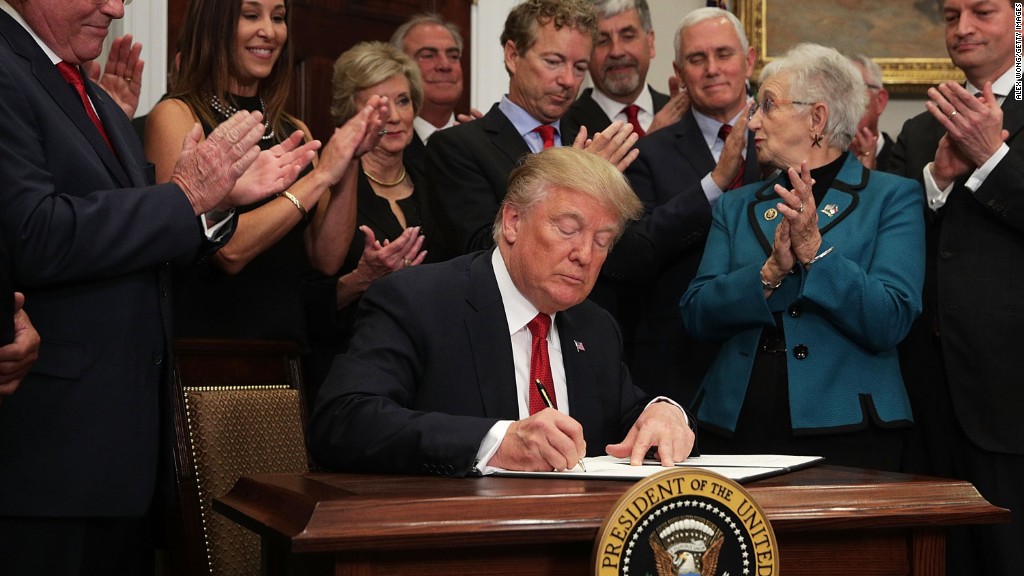
It's never been easy for Reem Aloul to hire a nursing director for her home health care business. She finally found someone she liked, but the interview ended soon after she told the nurse that the job didn't come with health benefits.
"It's a subject I know will come up and quite often it won't be a good answer," said Aloul, who opened her BrightStar Care franchise in 2013. "You do lose good candidates."
Soon, however, Aloul and other small business owners may have a more affordable option. The Trump administration is making it easier for small firms like hers to band together and buy coverage, using their scale to secure less expensive plans much like large employers do.
These so-called association health plans have existed for decades, but haven't been very popular. Companies often had to navigate complex regulations and meet strict criteria, including being in both the same industry and location, according to Chris Condeluci, who runs CC Law & Policy, a health care legal and policy practice.
The proposed regulation unveiled by the Department of Labor earlier this month would open up association health plans so that small firms in the same industry could join regardless of their location. Also, small employers in different industries could establish an association as long as they are in the same state or metro area. The plans would also be exempt from certain Obamacare provisions, allowing them to sell cheaper policies with fewer benefits.
The department is currently soliciting comments before it releases the final regulation.
Related: Trump officials unveil rule that could chip away at Obamacare
Small employers have long sought a way to provide health insurance to their staffs, but high premiums always proved a barrier. Only half of firms with between 3 and 49 workers offer coverage, according to the 2017 Kaiser/HRET Survey of Employer-Sponsored Health Benefits.
Several large trade associations say they and their members are eager to explore setting up association health plans once the federal government finalizes the regulations in coming months.
"Independent stores want to attract good employees and retain them," said Neil Trautwein, vice president for health policy at the National Retail Federation. "If the larger store down the block offers coverage and they can't, they are at a disadvantage."

Aloul knows this all too well. She has long wanted to provide health insurance for her five employees, but it was too expensive. So she offers a more flexible schedule and a higher salary, but that's often still not enough to convince some applicants to join her agency. The candidate for nursing director, for instance, is a single mom with two small children and said she could only take a position with benefits.
The proposed regulations could smooth the way for franchise firms like Aloul's to offer coverage to their workers. There are several ways it could work. A franchisor could set up a plan for its franchisees nationwide. Or it's possible the International Franchise Association, which has 743,000 members with several million employees, could create one.
Catherine Monson, chief executive at FASTSIGNS International, a signage and visual graphics company that has more than 600 locations and 4,200 employees in 48 states. Most of her franchisees offer coverage, but have few takers. They have been asking for years why they can't create a group health plan and offer lower-priced policies. Now, they will be able to, said Monson, a longtime advocate of association health plans.
"They are wondering why we can't move faster," she said of her franchisees, who have an average of seven employees each.
Related: What's in Trump's health care executive order?
Association health plans may not be right for all small businesses or their workers. Depending on how they are set up, some plans won't be able to set premiums for a company based on its employees' health, which generally drives up rates for younger and healthier folks.
However, the plans also won't have to cover all the services that are now required by the Affordable Care Act. So firms with sicker or older staff may find the benefits too skimpy for their needs, as could employees who suffer accidents or come down with serious illnesses.
"They will be popular until people start running out of coverage," said George Stadtlander, president of Consoliplex, an association plan manager in Cleveland, Ohio.
Stadtlander helps create one type of association health plan that is regulated by states and likely won't be affected by the new Trump administration rules.
One of his most recent ones is run by the Missouri Chamber of Commerce. Though the plan is allowed to use workers' health status to calculate a firm's rate, businesses have flocked to it in droves. It covered 250 employees and their families when it opened in November. That number has now swelled to 2,500 members.
The plan provides some good insight into how banding together could help some employers. The chamber itself -- which has only 25 staffers -- saw its premiums drop 20% when it joined.
"We've had tons of inquiries," said Brendan Cossette, the chamber's chief operating office. "It's spreading like wildfire."
Have you belonged to an association health plan or do you wish to join one? Is a short-term health insurance policy right for you? Email healthcarestories@cnn.com and you could be included in an upcoming article.


